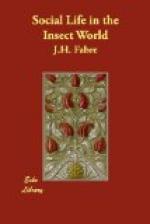Sound is equally out of the question. The big-bodied creature capable of calling her mates from such a distance is absolutely mute, even to the most sensitive ear. Does she perhaps emit vibrations of such delicacy or rapidity that only the most sensitive microphone could appreciate them? The idea is barely possible; but let us remember that the visitors must have been warned at distances of some thousands of yards. Under these conditions it is useless to think of acoustics.
Smell remains. Scent, better than any other impression in the domain of our senses, would explain the invasion of butterflies, and their difficulty at the very last in immediately finding the object of their search. Are there effluvia analogous to what we call odour: effluvia of extreme subtlety, absolutely imperceptible to us, yet capable of stimulating a sense-organ far more sensitive than our own? A simple experiment suggested itself. I would mask these effluvia, stifle them under a powerful, tenacious odour, which would take complete possession of the sense-organ and neutralise the less powerful impression.
I began by sprinkling naphthaline in the room intended for the reception of the males that evening. Beside the female, inside the wire-gauze cover, I placed a large capsule full of the same substance. When the hour of the nocturnal visit arrived I had only to stand at the door of the room to smell a smell as of a gas-works. Well, my artifice failed. The butterflies arrived as usual, entered the room, traversed its gas-laden atmosphere, and made for the wire-gauze cover with the same certainty as in a room full of fresh air.
My confidence in the olfactory theory was shaken. Moreover, I could not continue my experiments. On the ninth day, exhausted by her fruitless period of waiting, the female died, having first deposited her barren eggs upon the woven wire of her cage. Lacking a female, nothing could be done until the following year.
I determined next time to take suitable precautions and to make all preparations for repeating at will the experiments already made and others which I had in mind. I set to work at once, without delay.
In the summer I began to buy caterpillars at a halfpenny apiece.
The market was in the hands of some neighbouring urchins, my habitual providers. On Friday, free of the terrors of grammar, they scoured the fields, finding from time to time the Great Peacock caterpillar, and bringing it to me clinging to the end of a stick. They did not dare to touch it, poor little imps! They were thunderstruck at my audacity when I seized it in my fingers as they would the familiar silkworm.
Reared upon twigs of the almond-tree, my menagerie soon provided me with magnificent cocoons. In winter assiduous search at the base of the native trees completed my collection. Friends interested in my researches came to my aid. Finally, after some trouble, what with an open market, commercial negotiations, and searching, at the cost of many scratches, in the undergrowth, I became the owner of an assortment of cocoons of which twelve, larger and heavier than the rest, announced that they were those of females.




